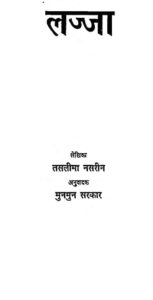 “Lajja” is a novel by the controversial Bangladeshi author Taslima Nasreen, first published in 1993. The book deals with the aftermath of the demolition of the Babri Masjid in Ayodhya, India, in 1992 and its impact on the lives of a Hindu family in Bangladesh.
“Lajja” is a novel by the controversial Bangladeshi author Taslima Nasreen, first published in 1993. The book deals with the aftermath of the demolition of the Babri Masjid in Ayodhya, India, in 1992 and its impact on the lives of a Hindu family in Bangladesh.
The novel spotlights on the Dutta family, who are Hindus living in Bangladesh. The patriarch of the family, Sudhamoy, is a previous government official who is currently resigned. His significant other, Kironmoyee, is a faithful Hindu who invests heavily in her religion and culture. Their child, Suranjan, is an understudy who is concentrating on in Dhaka and has become all the more politically mindful after the Babri Masjid destruction.
After the Babri Masjid episode, riots break out in Bangladesh, and Hindus become the objective of fierce assaults by Muslim fanatics. The Dutta family isn’t saved, and they are compelled to escape their home and look for shelter in an overall’s home in an alternate city. The family is profoundly impacted by the brutality and the deficiency of their home, and their confidence in the possibility of a common Bangladesh is broken.
Through the characters of the Dutta family, Nasreen investigates topics of communalism, strict fundamentalism, and the effect of legislative issues on private lives. She likewise brings up issues about the idea of public character, the job of religion in shaping society, and the significance of individual opportunity and articulation.
The book was exceptionally questionable when it was first distributed, and it confronted analysis and reaction from moderate Muslim gatherings who blamed Nasreen for disrespect and advancing enemy of Islamic feeling. The creator got demise dangers and had to escape Bangladesh and live someplace far off, banished for good.
Notwithstanding the debate, “Lajja” has been generally perused and talked about in South Asia and has turned into a significant work of writing on communalism and strict radicalism. It has been converted into numerous dialects, including English, and has been hailed as a strong investigate of strict patriotism and a call for secularism and resilience.